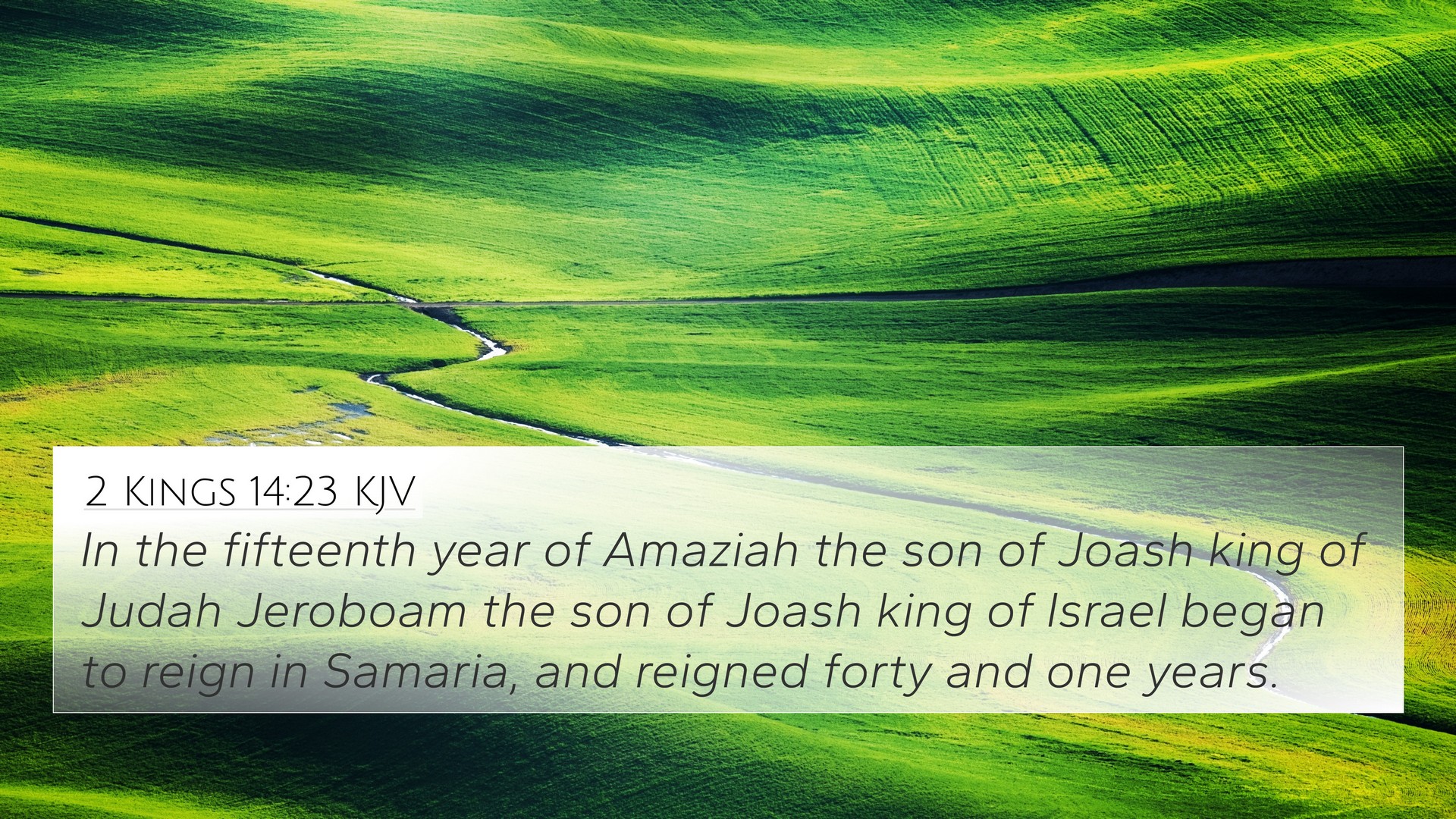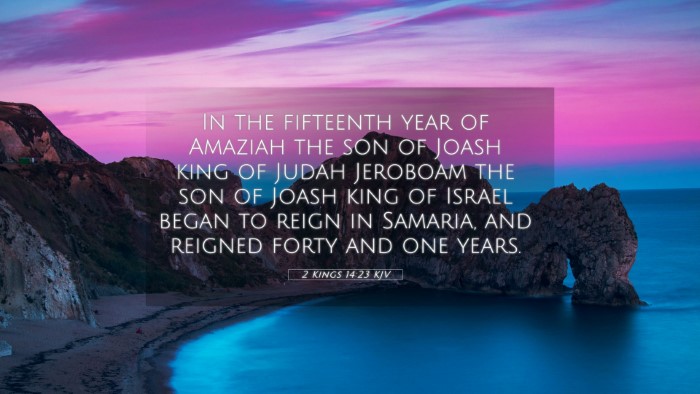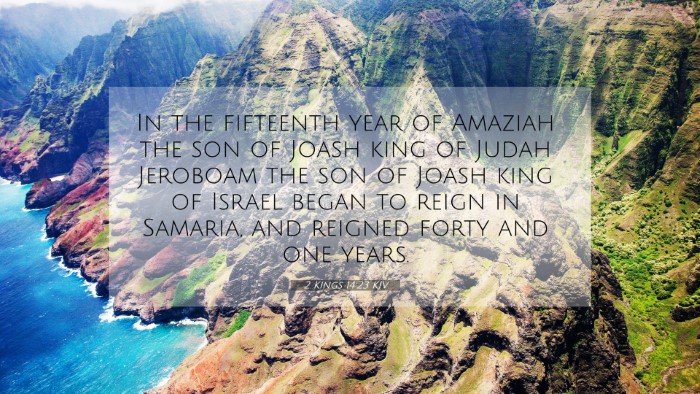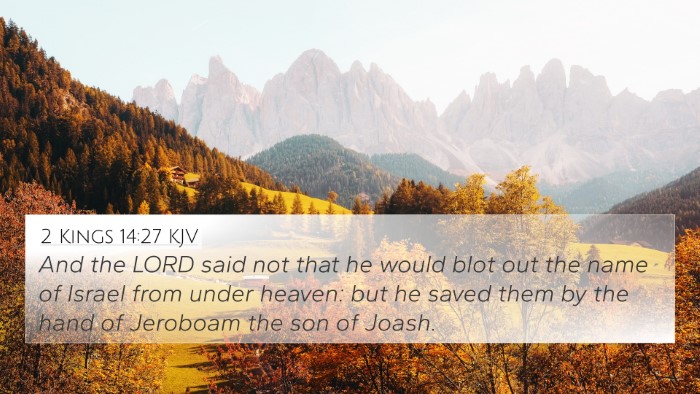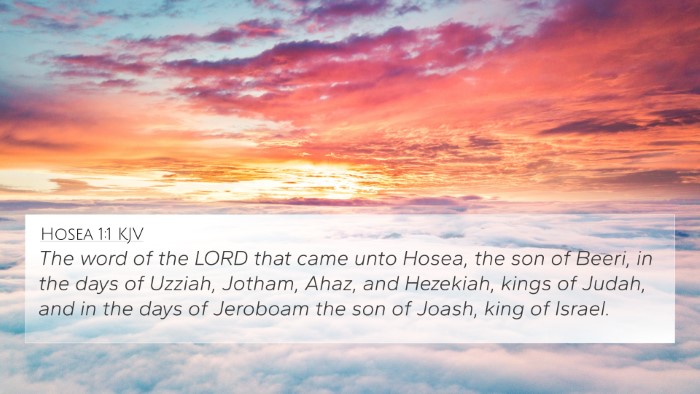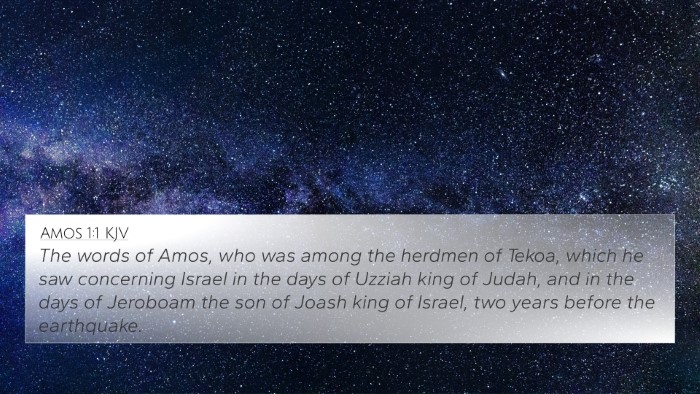Understanding 2 Kings 14:23
Verse: "In the fifteenth year of Amaziah the son of Joash king of Judah, Jeroboam the son of Joash king of Israel began to reign in Samaria, and reigned forty-one years."
Contextual Overview
This verse introduces Jeroboam II's reign over Israel and establishes a timeline within the narrative of the kings of Judah and Israel. It highlights the succession of leadership and sets the stage for the events that will unfold during Jeroboam's reign.
Commentary Insights
-
Matthew Henry:
Henry emphasizes the importance of the prophetic history of kings, noting that Jeroboam II's reign signifies a time of relative prosperity for Israel. However, he also anticipates the moral decline that will overshadow such prosperity, as leadership is subject to the moral fabric of the nation.
-
Albert Barnes:
Barnes highlights the length of Jeroboam's reign, indicating that forty-one years in leadership is significant in the turbulent cycle of Israel's kings. He notes the interconnections between the kings and the influence of surrounding nations on their rule, shedding light on the political dynamics of that era.
-
Adam Clarke:
Clarke draws attention to the parallels between Jeroboam II and his namesake, Jeroboam I. He stresses the continuity of worship practices and idolatry, suggesting that this pattern solidified during Jeroboam II’s reign, which ultimately led to Israel's downfall.
Key Themes
- Leadership and Legacy: The verse highlights the significance of leadership in shaping the nation's fate and the legacies that rulers leave behind.
- Historical Context: Understanding the timeline of kings aids in grasping the socio-political and religious atmosphere of the time.
- Prophetic Role: The role of prophets is crucial as they often serve as divine messengers during these turbulent times, reminding both Israel and Judah of their covenant with God.
Cross-References
2 Kings 14:23 relates closely to several other scriptures, illustrating various themes and narratives throughout the Bible:
- 2 Kings 14:16 - Discusses the death of Jeroboam II.
- Amos 7:9-11 - The prophecies against Israel during Jeroboam II's reign.
- 2 Kings 15:8-12 - Continues the narrative of Jeroboam II’s legacy and subsequent kings.
- 2 Chronicles 26:1 - Reference to the contemporary kings of Judah, emphasizing interrelationships.
- Hosea 1:1 - The prophetic context during the reign of Jeroboam II.
- Isaiah 7:1 - Insights into the political upheaval during the time of Jeroboam II.
- Matthew 1:12 - Genealogy of Jesus includes notable kings of Judah, reflecting the importance of lineage.
- Micah 5:2 - Prophecy associated with the lineage of David, culminating in Christ, indirectly linked to the kings of Israel.
- Hebrews 1:1-2 - Affirms the prophetic voices that arose during analogous times in Israel's history.
- Romans 15:4 - Discusses the purpose of Old Testament narratives for teaching and hope.
Application and Reflection
This verse, while historical, encourages a deeper examination of leadership qualities and the influence of morality within governance. As we reflect on 2 Kings 14:23, consider:
- How do the behaviors of leaders affect the culture and direction of a society?
- What lessons can be learned from the successes and failures of Biblical kings?
- In what ways do we mirror these ancient narratives in our modern context?
Conclusion
2 Kings 14:23 serves as a pivotal moment in the narrative of Israel's history, connecting the nation’s past with prophetic warnings and future implications. For those looking to explore the rich fabric of Scripture, this verse opens the door to various thematic connections and a deeper understanding of God’s overarching plan, emphasizing the significance of righteous leadership in accordance with divine will.
Tools for Further Study
For those interested in a deeper comparative analysis and cross-referencing of Biblical texts, several resources can enhance your study experience:
- Bible concordance for easy lookups of similar verses.
- Cross-reference bible study guides to explore connections.
- Tools to identify inter-biblical dialogues and thematic references.
- Comprehensive Bible cross-reference materials for intricate studies.
